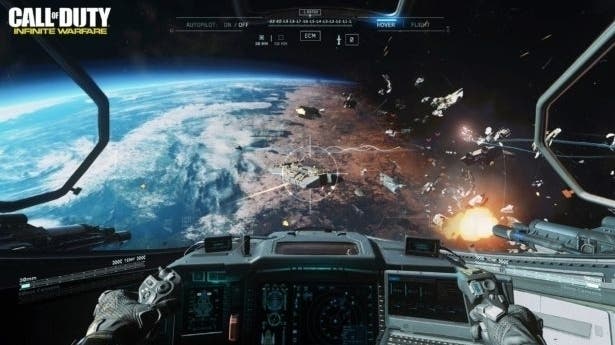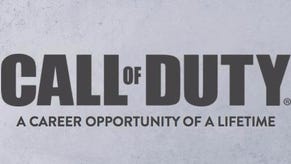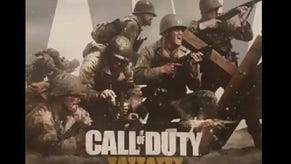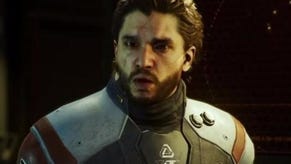Infinite Warfare should have been every bit as revolutionary as Call of Duty 4
Postmodern warfare.
There's a mission early in Infinite Warfare's campaign in which you assault the moon. Most shooters would think assaulting the moon a grandiose enough premise for 30 minutes of popping virtual heads. But in Operation Port Armour, assaulting the moon is merely the start. After clearing the Lunar Gateway of SDF soldiers (which you can do by blowing out the spaceport's windows, sucking your foes out into space), you then board your Jackal fighter craft and jump into lunar orbit for an extended dogfight with SDF fighters launching from a nearby Destroyer.
But the mission doesn't end there. Once the enemy fighters are down (or up - it is space after all), you disembark your Jackal for a Zero-G assault on the Destroyer itself, floating along its hull before blasting a hole in the bridge and clearing out the remaining crew from the inside. All this is delivered in one seamless sequence, from leaving the vehicle bay of the capital ship Retribution to blowing the final SDF soldiers out of the Destroyer's airlock.
Operation Port Armour is probably the best individual Call of Duty mission since Modern Warfare's 'All Ghillied Up', and one of several reasons why Infinite Warfare is my favourite Call of Duty of the last decade. Call of Duty spent years struggling to escape the shadow of 2007's landmark FPS, with results ranging from the madness of Black Ops to the misery of Ghosts. In Infinite Warfare, Infinity Ward delivered a bold and imaginative sci-fi adventure that innovated in ways the series hadn't seen before, and thanks to the surprisingly negative response to those innovations, also hasn't seen since.
Infinite Warfare takes place in 2187, presenting players with an Expanse-like vision of the future. Humanity has reached beyond Earth but not the sun, colonising Mars and establishing frontier-like outposts on distant moons such as Europa and Titan. The spread of humanity has given rise to new political factions and tensions beyond Earth's atmosphere, culminating in the formation of the Settlement Defence Force, or SDF.
The campaign kicks off when those tensions boil over into outright war. After Earth's military botches a recon mission to a research facility on Europa gone dark, the SDF's leader Salen Kotch launches a full-scale attack on a Naval Fleet Parada in Geneva. Your character, Captain Reyes, is on the ground when the attack takes place, and must fight through the bombarded city to regain control of its defence systems.
In terms of spectacle and linearity, Black Sky is a familiar Call of Duty affair. But even at this early stage, Infinite Warfare strives to set itself apart from earlier games in the series. Black Sky is considerably longer than your average Call of Duty mission, letting Infinity Ward build out Geneva as a space, and giving you time to comprehend the game's vision of the future. The level also introduces a bunch of new gadgets and mechanics, like seeker drones that attach themselves to enemies before exploding, hacking devices that let you take control of enemy robots and use them to attack your foes from behind.
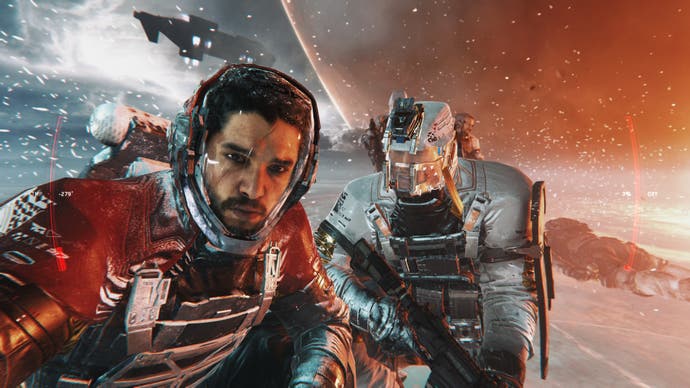
It already feels more unusual and adventurous, but these are mere tasters of what's to come. For the first time in almost ten years, Infinite Warfare introduces entirely new combat systems to Call of Duty. Space duels let you battle enemy spaceships in your Jackal, blasting fighters and destroyers with missiles and heavy cannons, while the Zero-G combat sees you floating through asteroid fields and along spaceship exteriors, using jet boosters and a grappling hook to zip around environments, seeking scraps of detritus to use as cover in the perilously exposed void of space. Crucially, these are not throwaway gimmicks, which came to dominate the games that followed Modern Warfare. They are fundamental elements central to the campaign's multifaceted missions.
And what missions those are. The solar system's broader canvas allows Infinity Ward's imagination to run wild. After Operation Port Armour, Reyes and his crew travel to Titan to sabotage an SDF fuelling station. Here, they sneak through the yellow-tinted canyons of Saturn's largest moon while methane rain patters on their helmets and the vast ringed planet looms over the horizon. This is followed by my personal favourite mission, a search-and-rescue operation on an asteroid spinning on a collision course with the sun. Here, you must dash between cover to avoid being incinerated by the 900-degree surface temperatures as you investigate why the asteroid's mining facility has gone dark. It really gets across the horror and hostility of space exploration, and that's before you start being attacked by armies of crazed robots.
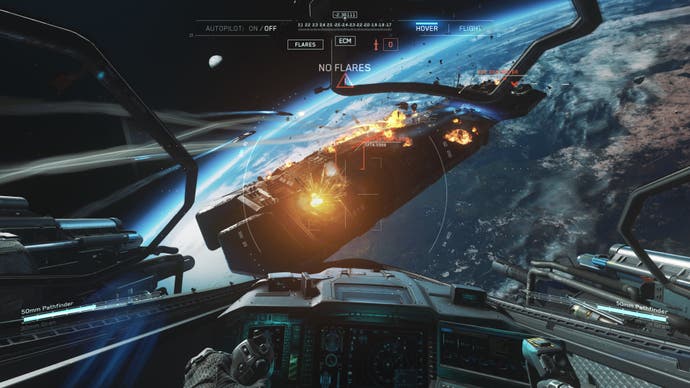
Call of Duty has always been a globetrotting series, and so the ability to stretch beyond the globe suits it perfectly. Yet despite the vast geographical jumps, Infinite Warfare is arguably the most cohesive Call of Duty campaign. Unlike every other game in the series, Infinite Warfare simulates the connective tissue between levels. Most missions are preceded by a preparation stage, where you head to the Retribution's armoury to select your loadout, then take the elevator down to the docking bay to board your ship. Similarly, they end with you landing back onto the Retribution before heading up to the bridge for the next briefing. Infinite Warfare even represents travelling between planets, with dramatic "warp" sequences reminiscent of the Enterprise crew rocking about in their chairs in Star Trek. It all helps to sell the fiction to you, to make the future Infinite Warfare's represent feel coherent and believable.
The whole experience is more ambitious than any Call of Duty before or since Modern Warfare. Which isn't to say that it's perfect. I don't mind Infinite Warfare's story. It has likeable enough characters, including David Harewood's gruff Staff Sergeant and a comedy murderbot called Ethan. But it's undermined by a weak enemy. When I first played it, I thought the problem was Kit Harington's underwhelming performance as Salen Kotch. But the issue is broader than that. The SDF's motivations and beliefs are thinner than Mars' atmosphere. Unlike the Expanse, Infinite Warfare has no real interest in exploring the politics behind its sci-fi war.
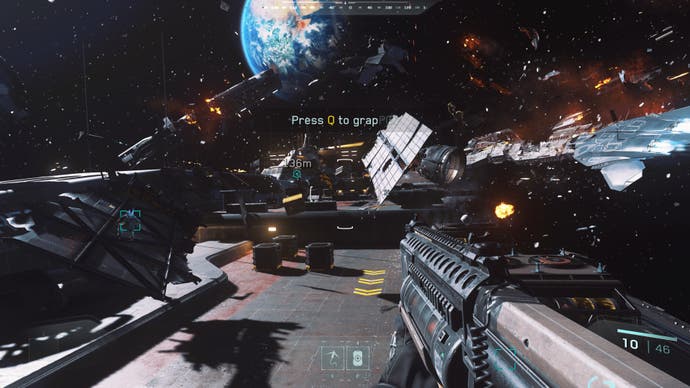
But Infinite Warfare's biggest problem, and what most separates it from Call of Duty 4, is that its ideas and innovations don't carry over to multiplayer. Whereas the campaign has spaceships and Zero-G combat and a host of spellbinding locations, the multiplayer basically adds wall-running and double-jumps to Call of Duty's existing template. It's bafflingly conservative, and Infinity Ward's reluctance to push the boundaries here represents one of the series' biggest missed opportunities.
Had Infinite Warfare replicated its ambitions in multiplayer it would doubtless be more highly regarded today, and Call of Duty as a series would look very different, pushing into new spaces rather than regurgitating old glories. Don't get me wrong, 2017's WWII and 2019's Modern Warfare were both well-made games, while the latter served as the springboard for Warzone, by far the most exciting thing Call of Duty has done in ages. But the games themselves were borne out of nostalgia, limited in what they could bring that was new.
I hope Infinity Ward brings Infinite Warfare back at some point, and gives the Jackals a second outing. But even if they don't, I think the game's reputation will only improve as time goes on. The joys of Call of Duty's multiplayer are fleeting, lasting only until the next entry in the series rolls around. It's the singleplayer that lives on, and Infinite Warfare's campaign is one of Call of Duty's very best.
